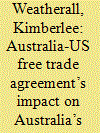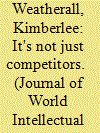|
|
|
Sort Order |
|
|
|
Items / Page
|
|
|
|
|
|
|
| Srl | Item |
| 1 |
ID:
140722


|
|
|
|
|
| Summary/Abstract |
The Australia-US Free Trade Agreement (AUSFTA) required extensive changes to Australian copyright law. This paper assesses the impact of these changes one decade on. It considers, first, whether the costs and/or benefits predicted in 2004 have eventuated, finding clear evidence that AUSFTA has undesirably constrained domestic copyright policy, but no clear evidence either of the feared financial costs to society, or, importantly, the touted benefits to copyright owners. The most significant impact of AUSFTA’s copyright provisions, however, appears to have been on Australia’s copyright trade policy. Pre-AUSFTA, Australia promoted multilateral standards and mostly sought to comply with, but not exceed, international IP standards. Post-AUSFTA, Australia has pursued an approach akin to that of the US: endorsing international copyright rules that are significantly stronger, and more detailed. The paper queries whether this shift has been in Australia’s national interest, and raises interesting questions of path-dependence in policymaking and trade negotiations that warrant more, and broader attention in the literature.
|
|
|
|
|
|
|
|
|
|
|
|
|
|
|
|
| 2 |
ID:
090980


|
|
|
|
|
| Publication |
2009.
|
| Summary/Abstract |
In patent, institutional design matters, and goals matter to institutional design. This article concerns the institutional design of mechanisms that can be used by third parties to challenge the validity of proposed or granted patents in the patent office-oppositions, revocations and similar processes. This article traces the various goals of these mechanisms, and how those goals have changed over time. It argues that recent economic and legal literature, which has influenced proposals for reforming these systems, is altogether too neat and tidy, treating public interest participants as interfering busybodies. It is better to acknowledge and embrace groups like Peer to Patent and the Public Patent Foundation, and think about how, in the long term, we can adjust aspects of the patent system to incorporate public input without too much sacrifice to politics and uncertainty.
|
|
|
|
|
|
|
|
|
|
|
|
|
|
|
|
|
|
|
|
|